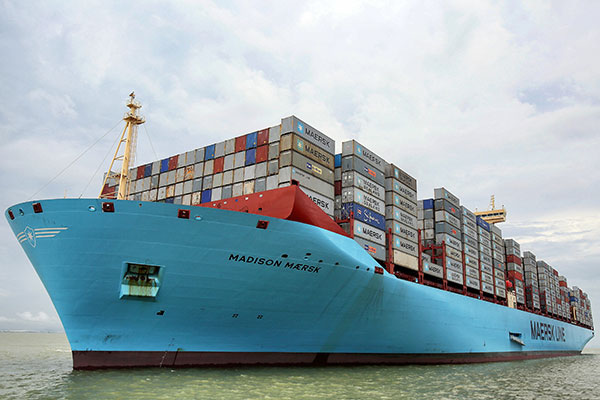|
 |
|
A Maersk container vessel docked at Nansha port in Guangzhou, Guangdong province. China is Maersk's largest source of cargo. [Photo/China Daily] |
Maersk to order more vessels from Chinese shipbuilders to boost capacity, says top official
This week's depreciation of the Chinese currency will help both international and domestic shipping operators in the region that have been stuggling of late with growing costs and rising competition, according to the head of the Maersk Group in North Asia.
Tim Smith, chief representative of the Danish shipping and energy conglomerate, said the moves by the People's Bank of China, the central bank, will strengthen Chinese manufacturers' ability to compete with their global rivals.
He also revealed his company is looking to order more vessels from Chinese shipbuilders, among "various options in China right now", part of wider plans to be announced next week to change capacities on some of its Asia-Europe routes.
China is Maersk's largest source of cargo. The firm controls 15 percent of the country's shipping capacity, spending $2 billion each year on equipment and other production materials, he said.
"Trade is a two-way business, however, and in the short term the depreciation of the yuan will affect China's import volumes," said Smith.
He said the euro has dropped 15 percent in value against the yuan over the past year, adding that he considered the government's currency adjustment as reasonable to put its economic growth on a firmer footing.
He said shipping volumes in the second half are usually stronger than in the first, and that Maersk is hoping to see an improvement in its traffic.
Maersk's second quarter group profit hit $1.1 billion globally, but was hit hard by falling oil prices and lower average container freight rates. It now expects profits of around $4 billion for 2015.
According to the latest data from the General Administration of Customs, China's foreign trade dropped 7.3 percent to 13.63 trillion yuan ($2.23 trillion) between January and July. Exports fell by 0.9 percent to 7.75 trillion yuan while imports slumped by 14.6 percent to 5.88 trillion yuan.
Currently around 90 percent of China's international trade is transported by sea, but shipping firms have been facing growing operating costs and their rates are still to recover to levels seen before the financial crisis of 2008.
Many companies have been balancing the use of larger ships traveling at lower speeds, with more careful planning to remain competitive.
Industry-wide figures show Asia-Europe trade dropped by 3 percent in the first half of 2015 due to added capacity within the fleets controlled by the large shipping alliances.
Individual shipping lines have also increased their capacity, putting more pressure on their earnings ability.
Jens Eskelund, the managing director of Maersk China, said that China's current economic focus on becoming more of a consumption-led market "continues to hold great potential for our industry", which is dominated by the use of container transportation.
